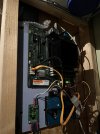Hi, for a while I'm having trouble with my Proxmox setup. It's probably not Proxmox related and my hardware is bit exotic, but maybe someone can point me in to the right direction.
After a few days, sometimes weeks, I get what I think are kernel panics (??), dmesg gives:
There are usually more messages like this but I don't know what I am looking at. I'm left with a weirdly unresponsive pve. Most of the 10+ containers keep functioning normally. But also most won't respond to a shutdown -h command. Killing stuff with kill -9 $pid doesn't work. The node won't reboot or shutdown either and I have to resort to a power cycle.
I've let memtest86 run its course over a night but zero errors. The hardware is a Fujitsu 3643 board and i5-8400T cpu (an engineering sample!) that should give me an very low power setup.
Any hints very much appreciated.
After a few days, sometimes weeks, I get what I think are kernel panics (??), dmesg gives:
Code:
[844132.205609] Call Trace:
[844132.205614] __schedule+0x2e6/0x6f0
[844132.205616] schedule+0x33/0xa0
[844132.205621] spl_panic+0xf9/0xfb [spl]
[844132.205625] ? spl_kmem_cache_alloc+0x7c/0x770 [spl]
[844132.205628] ? spl_kmem_cache_alloc+0x14d/0x770 [spl]
[844132.205630] ? __wake_up_common_lock+0x8c/0xc0
[844132.205677] ? zio_taskq_member.isra.14.constprop.20+0x70/0x70 [zfs]
[844132.205701] arc_buf_type.isra.23+0x4e/0x50 [zfs]
[844132.205745] arc_change_state.isra.29+0x27/0x480 [zfs]
[844132.205765] arc_freed+0xa7/0xc0 [zfs]
[844132.205816] zio_free_sync+0x52/0x100 [zfs]
[844132.205849] spa_free_sync_cb+0x3b/0x50 [zfs]
[844132.205881] ? spa_avz_build+0xf0/0xf0 [zfs]
[844132.205901] bplist_iterate+0xd1/0x140 [zfs]
[844132.205949] spa_sync+0x5c9/0xff0 [zfs]
[844132.205951] ? mutex_lock+0x12/0x30
[844132.205998] ? spa_txg_history_init_io+0x104/0x110 [zfs]
[844132.206032] txg_sync_thread+0x2e1/0x4a0 [zfs]
[844132.206066] ? txg_thread_exit.isra.13+0x60/0x60 [zfs]
[844132.206070] thread_generic_wrapper+0x74/0x90 [spl]
[844132.206072] kthread+0x120/0x140
[844132.206075] ? __thread_exit+0x20/0x20 [spl]
[844132.206076] ? kthread_park+0x90/0x90
[844132.206078] ret_from_fork+0x35/0x40There are usually more messages like this but I don't know what I am looking at. I'm left with a weirdly unresponsive pve. Most of the 10+ containers keep functioning normally. But also most won't respond to a shutdown -h command. Killing stuff with kill -9 $pid doesn't work. The node won't reboot or shutdown either and I have to resort to a power cycle.
I've let memtest86 run its course over a night but zero errors. The hardware is a Fujitsu 3643 board and i5-8400T cpu (an engineering sample!) that should give me an very low power setup.
Any hints very much appreciated.
Last edited:


